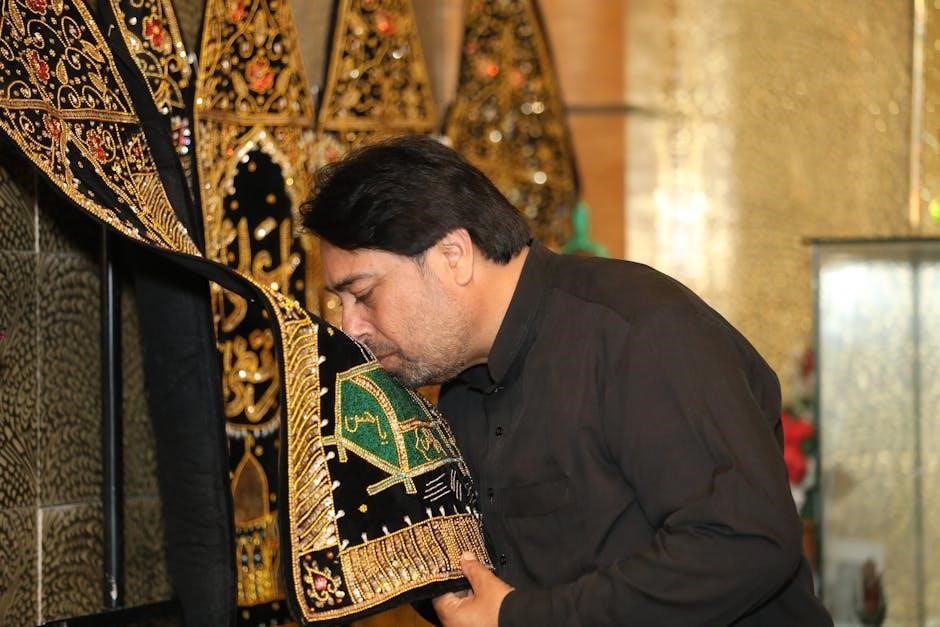This section explores the authenticity and truthfulness of Islam‚ focusing on the Quran‚ Prophet Muhammad’s teachings‚ and the moral framework it provides for humanity.
1.1. Purpose of the Article
This article aims to provide a comprehensive understanding of Islam’s teachings‚ addressing common misconceptions and presenting evidence for its authenticity. By exploring historical‚ theological‚ and cultural perspectives‚ it seeks to clarify the religion’s core principles and foster a deeper appreciation for its philosophical foundations‚ encouraging readers to engage with its teachings critically and open-mindedly.
1.2. Overview of Key Arguments

This section presents the central arguments for Islam’s truthfulness‚ focusing on the Quran’s preservation‚ moral teachings‚ scientific miracles‚ and the prophetic life of Muhammad (PBUH); It highlights Islam’s logical framework‚ the concept of Tawheed‚ and its ethical guidelines‚ addressing common misconceptions and comparing it with other religions to illustrate its unique aspects and universal appeal.

Historical Authenticity of the Quran
The Quran’s preservation through memorization and manuscripts‚ along with its linguistic and literary miracle‚ underscores its divine origin and historical authenticity‚ unchanged since revelation.
2.1. Preservation of the Quran
The Quran’s preservation is a testament to its divine origin. Through meticulous memorization by millions and meticulous written records‚ its text remains unchanged since revelation. Annual recitation during Ramadan ensures accuracy‚ while strict manuscript checks guarantee authenticity. This dual preservation method—oral and written—underscores Islam’s commitment to safeguarding its holy book‚ making it a reliable source of guidance for all humanity.
2.2. Linguistic and Literary Miracle
The Quran’s linguistic and literary uniqueness is unparalleled‚ with its inimitable style and poetic yet profound expression. Its structure and rhythm defy replication‚ challenging even the most skilled Arabic speakers. This miracle‚ known as I’jaz‚ highlights the Quran’s divine origin‚ as it transcends human literary capabilities. Its preservation over centuries further underscores its authenticity and timeless relevance to humanity.
The Life and Teachings of Prophet Muhammad (PBUH)
Prophet Muhammad’s life exemplifies moral excellence‚ compassion‚ and justice. His teachings emphasize righteousness‚ equality‚ and mercy‚ inspiring transformative societal change in Arabia and beyond.
3.1. His Character and Moral Excellence
Prophet Muhammad (PBUH) exemplified unparalleled moral excellence‚ embodying compassion‚ justice‚ and fairness. The Quran praises his noble character‚ and his actions‚ as recorded in hadiths‚ reflect humility and mercy. His treatment of adversaries‚ the weak‚ and the poor showcased a divine moral standard. This ethical framework‚ aligned with Quranic teachings‚ serves as a timeless model for believers‚ underscoring Islam’s truth through his exemplary life.
3.2. Prophecies and Miracles Attributed to Him
The Prophet Muhammad (PBUH) is believed to have performed numerous miracles and fulfilled prophecies‚ as recorded in the Quran and Hadiths. These include the miraculous preservation of the Quran‚ the splitting of the moon‚ and accurate predictions of future events. His moral excellence and compassionate leadership further reinforce his divine mission‚ inspiring followers worldwide to embrace Islam as the true path to spiritual enlightenment and salvation.
The Concept of One God (Tawheed) in Islam
Islam’s central doctrine of Tawheed emphasizes the oneness and uniqueness of God‚ rejecting idolatry and polytheism. It underscores the unity of worship‚ purpose‚ and moral guidance.
4.1. The Unity and Uniqueness of God
Tawheed‚ or the oneness of God‚ is central to Islam‚ emphasizing God’s indivisibility and uniqueness. This concept rejects polytheism and attributes‚ asserting God’s absolute sovereignty. The Quran highlights God’s unity‚ while Hadiths reinforce this belief‚ guiding Muslims to worship and live consistently with this principle‚ ensuring a coherent and unwavering faith.
- Rejects polytheism and attributes.
- Guides worship and daily life.
- Ensures a coherent faith.
4.2. The Logical and Philosophical Arguments for Tawheed
The concept of Tawheed‚ or the oneness of God‚ is supported by logical and philosophical reasoning. It emphasizes the unity of God’s existence‚ attributes‚ and worship‚ refuting polytheism and idolatry. Philosophical arguments include the cosmological argument‚ which posits God as the uncaused cause of the universe‚ and the argument from design‚ highlighting the order in creation as evidence of a single‚ intelligent Creator.
These arguments align with human reason and the natural inclination to recognize a single‚ supreme being‚ reinforcing Islam’s monotheistic foundation.
Scientific Miracles in the Quran
The Quran contains accurate descriptions of scientific phenomena‚ such as cosmology and embryology‚ which align with modern discoveries‚ showcasing its divine origin and truthfulness.
5.1. Verses Related to Cosmology and Astronomy
The Quran contains verses describing cosmic phenomena‚ such as the expansion of the universe (Quran 51:47) and the orbits of celestial bodies (Quran 36:40)‚ which align with modern scientific discoveries. It also mentions the darkness of the deep sea (Quran 24:40)‚ showcasing its alignment with natural laws. These scientific miracles highlight Islam’s divine authorship and timeless relevance‚ supporting its truthfulness through empirical evidence and rational inquiry.
5.2. Medical and Biological Miracles
The Quran contains remarkable descriptions of embryology‚ detailing fetal development stages with precision. Modern science confirms these descriptions‚ such as the formation of bones and flesh. Additionally‚ verses about health‚ hygiene‚ and nature align with contemporary medical understanding‚ showcasing Islam’s divine wisdom and reinforcing its truthfulness through scientific validation.

The Moral and Ethical Framework of Islam
Islam provides a comprehensive moral code emphasizing justice‚ compassion‚ and fairness‚ guiding personal conduct and societal harmony with universal ethical principles applicable to all aspects of life.
6.1. Personal Morality and Character Development
Islam emphasizes the cultivation of high moral character‚ balancing faith and deeds. It teaches virtues like honesty‚ justice‚ and compassion‚ guiding believers to refine their inner selves. The Quran and Hadith provide practical wisdom‚ fostering a sense of accountability and self-awareness. This ethical framework helps individuals grow spiritually and socially‚ promoting a holistic development of personality rooted in divine guidance and societal harmony.
6.2. Social Justice and Fairness
Islam emphasizes social justice and fairness‚ advocating for equality and compassion. It promotes the fair distribution of resources‚ protection of the oppressed‚ and justice for all. Teachings such as zakat (charity) and the prohibition of usury aim to reduce economic inequality. Prophet Muhammad (PBUH) stressed fairness in dealings‚ ensuring rights for women‚ orphans‚ and the needy‚ reflecting Islam’s commitment to a just and equitable society.

The Concept of the Afterlife in Islam
Islam emphasizes belief in the afterlife‚ where souls face judgment for their deeds. This belief in the Hereafter is central to Islamic faith‚ guiding moral accountability and eternal consequences.
7.1. Belief in the Hereafter
Islam emphasizes the belief in an afterlife‚ where individuals are held accountable for their deeds. This belief motivates Muslims to live righteously‚ striving for paradise and avoiding hell. The Quran describes the Day of Judgment in detail‚ highlighting divine justice and the ultimate purpose of human existence.

7.2. The Day of Judgment and Accountability
In Islam‚ the Day of Judgment (Qiyamah) is a central belief‚ where all individuals will be resurrected and held accountable for their deeds. This event emphasizes divine justice‚ rewarding the righteous and punishing the wicked based on their actions and faith. The concept underscores the moral responsibility of humans‚ highlighting Islam’s emphasis on ethical living and accountability before God.

Addressing Common Misconceptions About Islam
Clarifying stereotypes and misunderstandings about Islam‚ this section addresses misconceptions such as the true nature of Jihad and the religion’s stance on women’s rights‚ promoting peace and justice.
8.1. Clarifying Stereotypes and Misunderstandings
Common misconceptions about Islam often stem from cultural biases or media portrayals. Islam is frequently misunderstood regarding gender roles‚ with stereotypes ignoring its emphasis on equality and justice. Jihad‚ often misrepresented as holy war‚ primarily refers to personal spiritual struggle. Addressing these misunderstandings requires exploring Islamic teachings and separating them from cultural practices‚ fostering a more accurate understanding of the religion’s true nature and values.

8.2. The True Nature of Jihad and Other Controversial Topics
Jihad‚ often misrepresented‚ primarily refers to the internal spiritual struggle for self-improvement and moral growth. It also encompasses striving for justice and protecting the innocent. Islam emphasizes fairness and compassion‚ even in conflict. Misconceptions arise from selective interpretations‚ but Islamic teachings advocate balance and ethical conduct in all aspects of life‚ including controversial topics often misunderstood in modern discourse.
Comparative Analysis with Other Religions
This section examines Islam’s unique aspects compared to Christianity and Judaism‚ highlighting shared roots and distinct teachings that affirm Islam’s truth and relevance.
9.1. Similarities and Differences with Christianity and Judaism
Islam shares roots with Christianity and Judaism‚ emphasizing monotheism‚ moral accountability‚ and prophetic guidance. All three religions reverence key figures like Abraham and Moses. However‚ Islam uniquely emphasizes Tawheed‚ rejecting the Trinity and affirming Jesus as a prophet‚ not divine. While Christianity centers on salvation through Jesus‚ Islam focuses on submission to God’s will‚ differing in theological and practical aspects despite shared ethical values.
9.2. The Unique Aspects of Islam
Islam’s uniqueness lies in its finality as a divine revelation‚ emphasizing the oneness of God and the completeness of its teachings. The Quran’s linguistic miracle and preservation set it apart‚ while its comprehensive guidance on personal and societal life addresses spiritual‚ moral‚ and social realms. Islam’s emphasis on justice‚ equality‚ and compassion‚ coupled with its balanced approach to faith and reason‚ makes it distinct among religions.
10.1. Summary of Key Points

10.2. Final Thoughts and Encouragement for Further Study
Islam offers a comprehensive and balanced approach to spirituality‚ morality‚ and daily life. By examining its teachings‚ one can gain deeper insights into its universal appeal and relevance. Encouraging further study‚ readers are invited to explore Islamic texts and engage in meaningful dialogues to foster understanding and appreciation of its profound truths and guidance for humanity.
